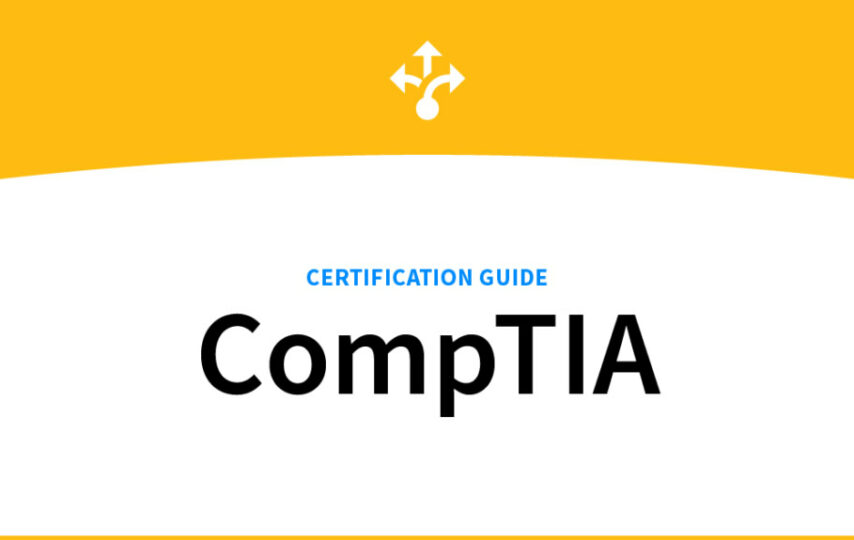CompTIA is a non-profit trade association with headquarters near Chicago and more than 2,000 member organizations and 3,000 business partners. CompTIA is prominent in philanthropy and public policy advocacy, despite the fact that its primary focus is on IT professional education and certification.
Overview of the CompTIA certification programme
CompTIA’s vendor-neutral certification programme is widely recognised as one of the best in the IT industry. Since developing the A+ certification in 1993, CompTIA has issued over two million certifications.
CompTIA introduced the CompTIA Infrastructure Career Pathway at the beginning of 2018. This new career pathway programme aligns CompTIA certifications more closely with the real-world skills IT professionals need to manage and support IT infrastructures successfully.
By skill set, CompTIA certifications are organized. Right Now, CompTIA certifications fall into four different categories: Core, Infrastructure, Cybersecurity, and Additional Professional.
- Core Certifications: CompTIA offers four Core certifications designed to build core foundational skills: IT Fundamentals (a pre-career certification focusing on IT foundation framework), CompTIA A+ (targeting user support and device connectivity), CompTIA Network+ (focusing on core system connections with endpoint devices), and CompTIA Security+ (focused on entry level cybersecurity skills).
- Infrastructure Certifications: CompTIA offers three Infrastructure certifications designed to complement the Network+ credential: CompTIA Server+ (focused on server support and administration), CompTIA Cloud+ (covering hybrid cloud, virtual system administration, and deploying network storage resources), and CompTIA Linux+ (focused on Linux operating system administration and management).
- Cybersecurity Certifications: CompTIA offers three cybersecurity certifications: CompTIA CySA+ (CySA stands for Cyber Security Analyst and targets IT security behavioural analysts), CompTIA CASP+ (CompTIA Advanced Security Practitioner; targets professionals who design and implement security solutions), and CompTIA PenTest+ (Penetration testing, targets professionals who conduct penetration and vulnerability testing).
- Additional Professional Certifications: This category includes CompTIA Project+, CompTIA CTT+, and CompTIA Cloud Essentials, which do not easily fit into any of the preceding CompTIA career paths.
If you wish to enhance your career in the field of information technology or make a career change into the most exciting and demanding industry then you must visit How To Network’s Website. They provide training for cloud engineers, network technicians, project management, and network security, from absolute beginners to experts. Check out their CompTIA Security+ Study Guide & training programs to boost your preparation.
Job Opportunities
CompTIA groups its certifications into multiple career paths, in addition to certification levels:
- Information security
- Network and cloud technologies
- Hardware, services and infrastructure
- IT management and strategy
- Web and mobile
- Software development
- Training
- Office productivity
The CompTIA Certifications page allows you to select a certification level and/or a career path before displaying a list of certifications to prioritize. One of the most popular IT career paths is network administration, for instance. CompTIA’s Network and Cloud Technologies career path offers a variety of certifications that can help you advance your network administration career, including IT Fundamentals, A+, and Network+ (Core certs), as well as Cloud+, Linux+, and Cloud Essentials (Infrastructure certs).
Those who are interested in network security (one of the fastest-growing IT fields) should consider CompTIA’s Security certifications. This includes all four Core certifications (IT Fundamentals, A+, Network+, and Security+) as well as all three cybersecurity credentials (CySA+, PenTest+, and CASP+).
CompTIA has a full IT certification roadmap that includes certifications from Cisco, EC-Council, Microsoft, (ISC)2, ISACA, Mile2, and more, as well as certifications from CompTIA.
Due to the fact that CompTIA credentials do not emphasise a single skill (such as networking or virtualization), CompTIA credential holders may find themselves in a variety of job roles based on their experience, skill levels, and areas of interest. CompTIA-credentialed individuals may be able to pursue the following careers:
- CompTIA A+ Certification: A+ holders typically find employment in support positions, such as support administrators, support technicians, and support specialists.
- CompTIA Network+ Certification: Network+ professionals are primarily network analysts, administrators, and support specialists. Those who have earned credentials can also work as field technicians, help desk technicians, and network engineers.
- CompTIA Security+ Certification: Security encompasses a wide range of occupations, including network, system, and security administrators, security managers, specialists, and administrators, and security consultants.
- CySA+ Cybersecurity Analyst: Common roles for those interested in cybersecurity, information security, and risk analysis include security engineers, cybersecurity analysts or specialists, threat or vulnerability analysts, and security operations centre analysts (SOCs).
- CompTIA Server+ Certification: Professional server roles include storage and server administrators, server support personnel, and IT/server technicians.
Even though the jobs listed above aren’t all of them, they give you an idea of what you can do. Your career choices are only limited by your interests, creativity, and determination to reach your own goals.
Candidates for the CompTIA A+, Linux+, Network+, Server+, Security+, and IT Fundamentals+ certifications must visit 101labs.net, the organization’s online exam preparation tool. 101labs.net’s study guides will helps you to boost your preparation.








